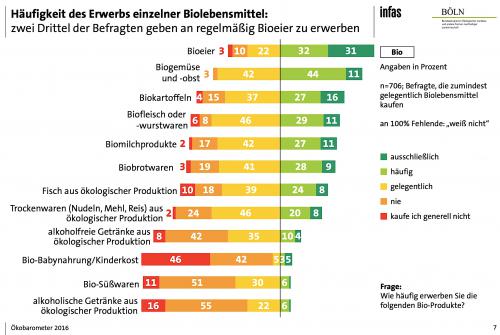
Last year they proved again, they are heavy user of organic products 8,62 Billion Euro they spent on that, 4,4 % of the total of food . Yes they buy in normal retail, a bit in open markets and also in specialist shops. Not everybody wants to reveal that the majority of new products has been taken from discount shops.
What did they like to buy in organic quality. First of all eggs, because they know the ugly reality of mass farming in normal egg industry a very few people also know that organic eggs may have a better taste. Similar situation with fruit an vegetables. The fear of pesticides and perhaps for some more people also the better taste.
 And then will follow milk and milk products, meat and sausages. These are also categories with good arguments to buy organic quality because for germans animal welfare is a very important issue. And they also see a bitt hat the conventional production of those animal products is spoilt. So people have arguments to stay away – even if this argumentation may be ruled more by emotions.
And then will follow milk and milk products, meat and sausages. These are also categories with good arguments to buy organic quality because for germans animal welfare is a very important issue. And they also see a bitt hat the conventional production of those animal products is spoilt. So people have arguments to stay away – even if this argumentation may be ruled more by emotions.
Concerning food categories with low level of real arguments to buy organic, there is a low choice. Only 3 % of the population tell in the survey they are buying every food product in organic quality, in reality that may be even less. We have a part of around 25% of the germans beeing clients of organic products, in case that makes sense to them. Well educated people, living more in bigger cities, in the ancient western part of germany, and having an monthly income more than 3000 euro.
Regarding the vegan and the vegetarian trend – it is a bit part of the organic nutrition, but not the majot thiung. Yes, women tend to accept that on could stay away more from meat and yes, we have a growth in the sales of these products but this thinking is not the dominant part in organic motivation. May-be it is a more general idea to eat less meat.
